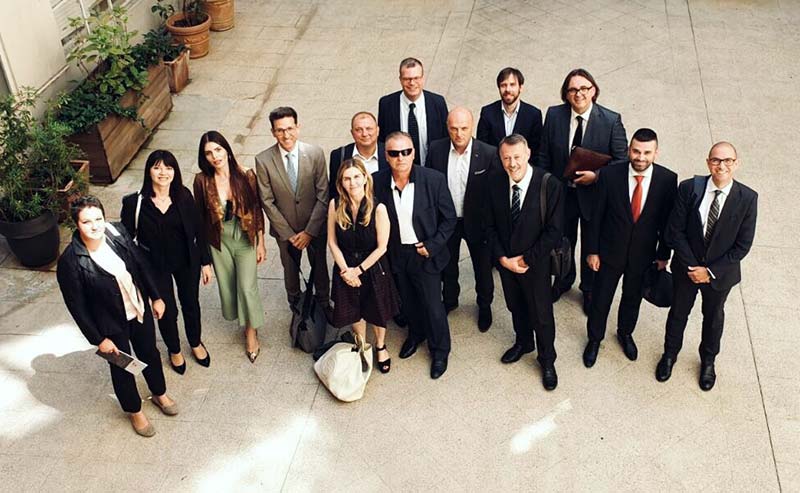The delegation from Bosnia and Herzegovina (BiH) participating to the technical study visit to Paris was composed of as follows:
- Mr Mahmut Švraka, Chief Prosecutor of the Public Prosecutor’s Office of Republika Srpska, Member of the High Judicial and Prosecutorial Council of BiH (HJPC BIH) and Chair of the Standing Committee for Prosecutors’ Efficiency at the HJPC BIH
- Mr Miodrag Bajić, Deputy Chief Prosecutor of the Public Prosecutor’s Office of Republika Srpska – Special Prosecutor/Head of Special Department for fighting corruption, organized crime and the most serious forms of economic crime
- Mr Pavo Radoš, Deputy Chief Prosecutor of the Prosecutor’s Office of Brčko District of BiH
- Mr Admir Suljagić, Director of the Secretariat of the High Judicial and Prosecutorial Council of BiH
- Ms Sabina Sarajlija, Chief Prosecutor of Prosecutor’s Office of Sarajevo Canton
- Mr Mirza Hukeljić, Prosecutor of the Prosecutor’s Office of BiH
- Mr Mirza Hadžiomerović, Deputy Head of the Office of the Disciplinary Prosecutor
- Mr Tihomir Jurko, Deputy Chief Prosecutor of the Federal Prosecutor’s Office of the Federation BiH
- Mr Drino Galičić, National Legal Adviser on Rule of Law at the DEU and EUSR
- Mr Jens Woelk, Senior Legal Advisor for EU integration matters at the HJPC BiH
- Ms Lejla Selmanović, Associate of Senior Legal advisor for EU integration matters at the HJPC BiH
Ms Isabelle Arnal, Team Leader of the project, had accompanied the delegation with the interpreter Ms Lejla Taljić.
On the first day of the technical study visit a general briefing on the French legal system and the weekly activities foreseen for the Delegation was provided by representatives of the GiP – Justice Coopération Internationale (JCI) at JCI’s premises. This introductory meeting was an opportunity for the members of BiH Delegation to ask relevant preliminary questions related to institutions they were going to visit, such as General Inspectorate for Justice or High Council of Magistrates. A more detailed discussion on some future activities within the EU4Justice project continued later in the presence of Mr. Renaud Van Ruymbeke.
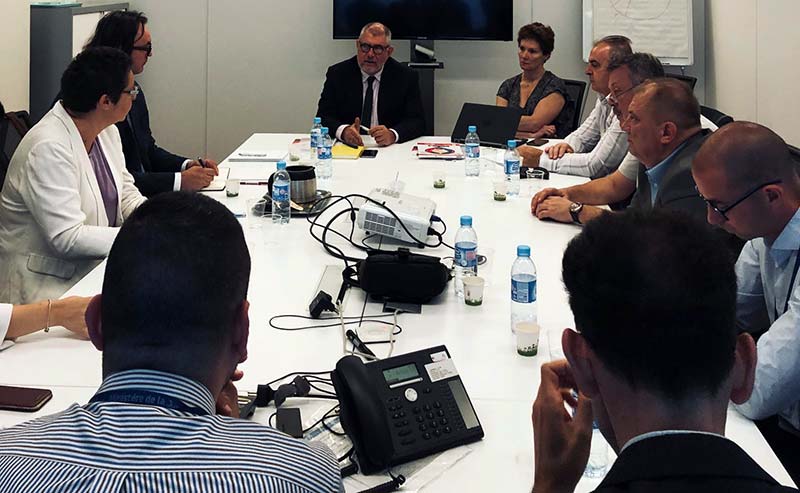
At the Inspection Générale de la Justice IGF (General Inspectorate for Justice) body of the Ministry of Justice, the BiH delegation met Mr Beynel, Chief of the Inspectorate, who together with his colleagues, presented the overall organisation, missions, work and track record of the Inspectorate.
With respect to judges and prosecutors, the IGJ has four main missions as follows:
- i) Oversight of the functioning of the Courts and Prosecutors ‘Offices;
- ii) Administrative investigation (enquete administrative);
- iii) Audit of Courts and Prosecutors ‘Offices; and
- iv) evaluation missions on public policies such as criminal policy on a specific topic.
With respect to disciplinary matters, the Inspectorate has a role to conduct preliminary administrative investigations in full independence. The decision whether to launch a disciplinary proceeding against a magistrate (judge or prosecutor) is left to the discretion of the Minister of Justice on the basis of the written report submitted by the Inspectorate. The High Council of Magistrates (CSM) is the sole body competent to conduct the disciplinary proceedings. It adjudicates in disciplinary cases regarding Judges, and provides an Opinion to the Ministry of Justice regarding the disciplinary cases involving Prosecutors.
As a result of the visit, three Inspectors of the IGJ will carry out immersion missions in the Office of the Disciplinary Prosecutor (ODP) in Sarajevo this autumn, while ODP members will be working on practical cases in the area of administrative investigation in Paris in early 2020.
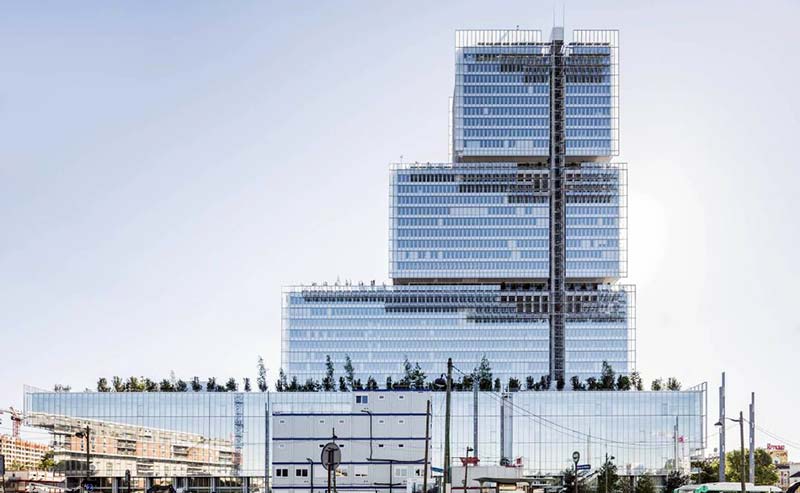
At the Tribunal of First Instance of Paris (TGI), the BiH delegation met with Ms Flocquet, the vice-prosecutor and Head of the Organized Crime Unit within the Prosecutor’s Office of Paris. This unit is also part of the Interregional Specialised Task Force for Paris (JIRS), in charge of investigating and prosecuting the most complex cases of organised crime, including at international level. Ms Flocquet presented the overall organisation, work of the institution and the methodology used to bring the criminals before a court. The purpose of the visit was to understand on one hand the objectives of the new organisation, i.e., respond to needs for specialised prosecutors and the challenges of coordinating complex investigations between different structures (JIRS and individual Prosecutors’ Offices) on the other.
At the meeting at the Parquet National Financier (National Financial Prosecution Office), Mr Toublanc, Secretary-General, presented the work of the institution which was established by the law dated 14 December 2013. This unique institution operates nationwide with the following fields of competence:
- Breach of probity: corruption, trading in influence, favouritism, misappropriation of public funds, unlawful acquisition of interest, bribery, vote-buying;
- Damage to public finances: aggravated tax fraud, money laundering, VAT offences
- Stock exchanges violations: insider dealing, price manipulation, dissemination of false information (the competence on offences related to stock exchanges is exclusive)
PNF’s prosecutors work with assistants who are specialised in stock exchanges, financial analysis, tax and procurements matters in order to be more efficient.
The PNF presentation showed that one of the paramount criteria to assess its work was the amount of asset confiscation and recovery, as well as fines and compensations decided by the Criminal Court of Paris in PNF criminal cases.
Le Conseil Supérieur de la Magistrature (CSM) – the High Council of Magistrates
Mr Sudre, Deputy Prosecutor General at the Court of Cassation and Vice-President of the prosecutorial sub-council, Mr Cabut, Deputy Prosecutor of the Prosecutors’ Office of Evry and member of the judicial sub-council, Mr Natali, attorney-at-law designated by the President of the National Bar Council, all members of the High Council of Magistrates made a general presentation of the institution followed by specific elaborations on the performance appraisal and evaluation of judges and prosecutors disciplinary and ethical (deontological) issues and on general cross-cutting missions of the Council.
The Council is composed of judges, prosecutors and members from the civil society. The members continue to exercise their professional activity of judge or prosecutor in parallel with their membership in the Council.
According to Article 65 of the French Constitution, the High Council of Magistrates is responsible for disciplinary and ethical matters. As stated before, it adjudicates in disciplinary proceedings against judges, and provides an opinion to the ministry of justice on decisions involving prosecutors. The appeal against disciplinary decisions is possible to the Conseil d’Etat, the highest administrative court in France.
In contrast to the situation in BiH, the performance appraisal and evaluation of judges and prosecutors is based only the quality and not on quantity. Judges and prosecutors do not have any prescribed annual quota.
The last day of the study visit was dedicated to meetings at The Prosecution Services of Versailles, The Court of Appeal of Versailles and The First Instance Tribunal of Versailles.
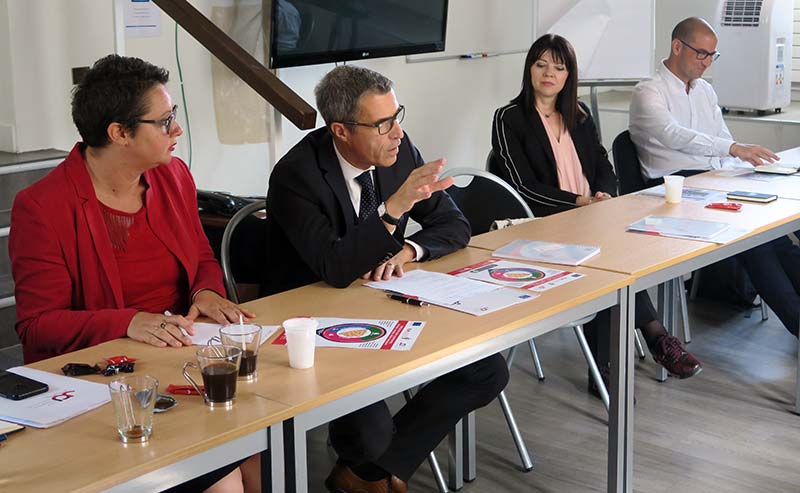
Mr Cimamonti, Prosecutor General at the Court of Appeal of Versailles, explained the prerogatives of his function in the French prosecutorial structure and the evolution of the prosecutorial functions. The sincerity of his comments was particularly appreciated by the delegation and prompted further questions.
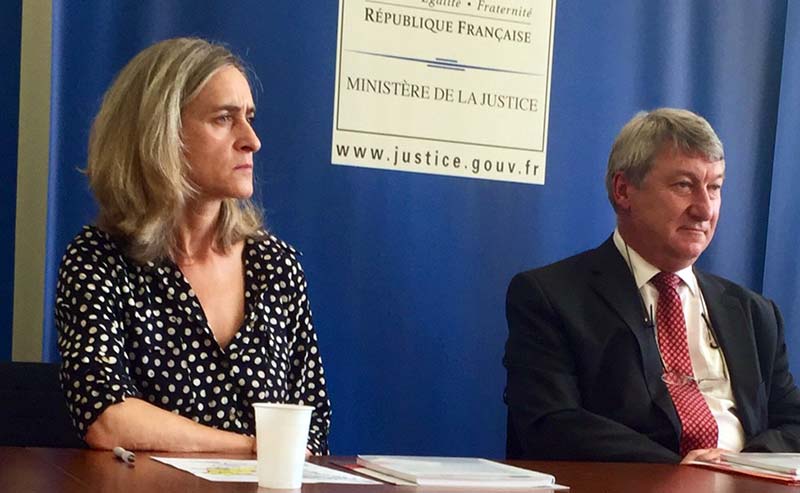
In the afternoon, the delegation was welcomed at the First Instance Tribunal of Versailles by Ms Dervieux, Deputy Prosecutor. The delegation met with Mr Mackowiak, President of the Court of Versailles, and Ms Caillibotte, Chief Prosecutor of Versailles. The interlocutors presented the functioning of the First Instance Tribunal of Versailles and its organisation as a “diarchy”, it is managed together by the Chief Prosecutor (direct competence over the prosecutors) and the Court President (direct competence over the judges). BiH Delegation also visited a number of specialised units of the Prosecutor’s Office (e.g. complaints and reports from the police in direct) and attended the trial session when a sentence was passed against a perpetrator of a criminal offence in the shortened proceedings (comparution immédiate).
Overall, the technical study visit of BIH Delegation to Paris has been assessed as very successful. The exchange of information and views certainly paved the way to a new approach of the two legal systems. For the time being this visit represented an excellent starting point for future cooperation, which could only benefit the judiciary in BiH.
Links:

